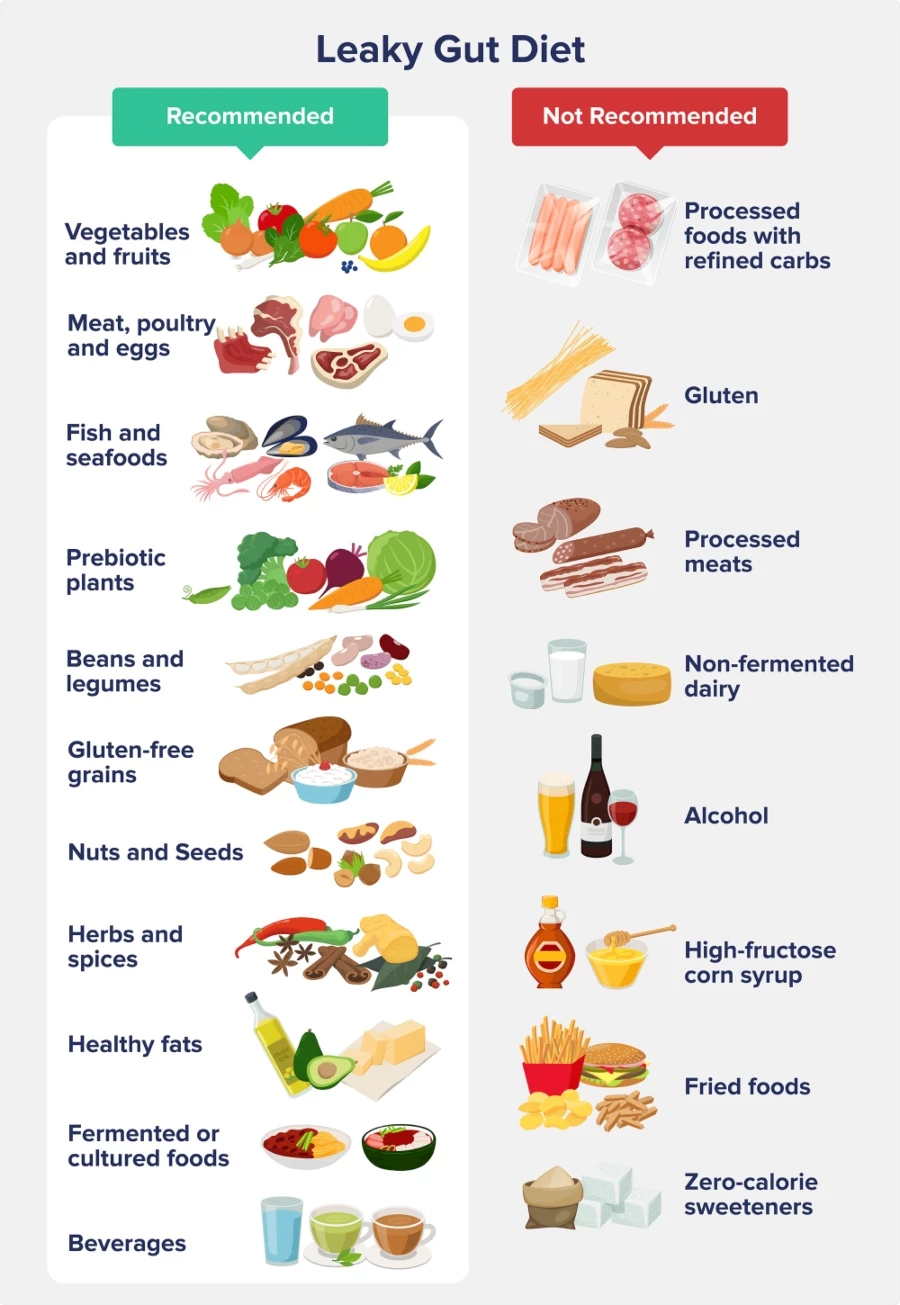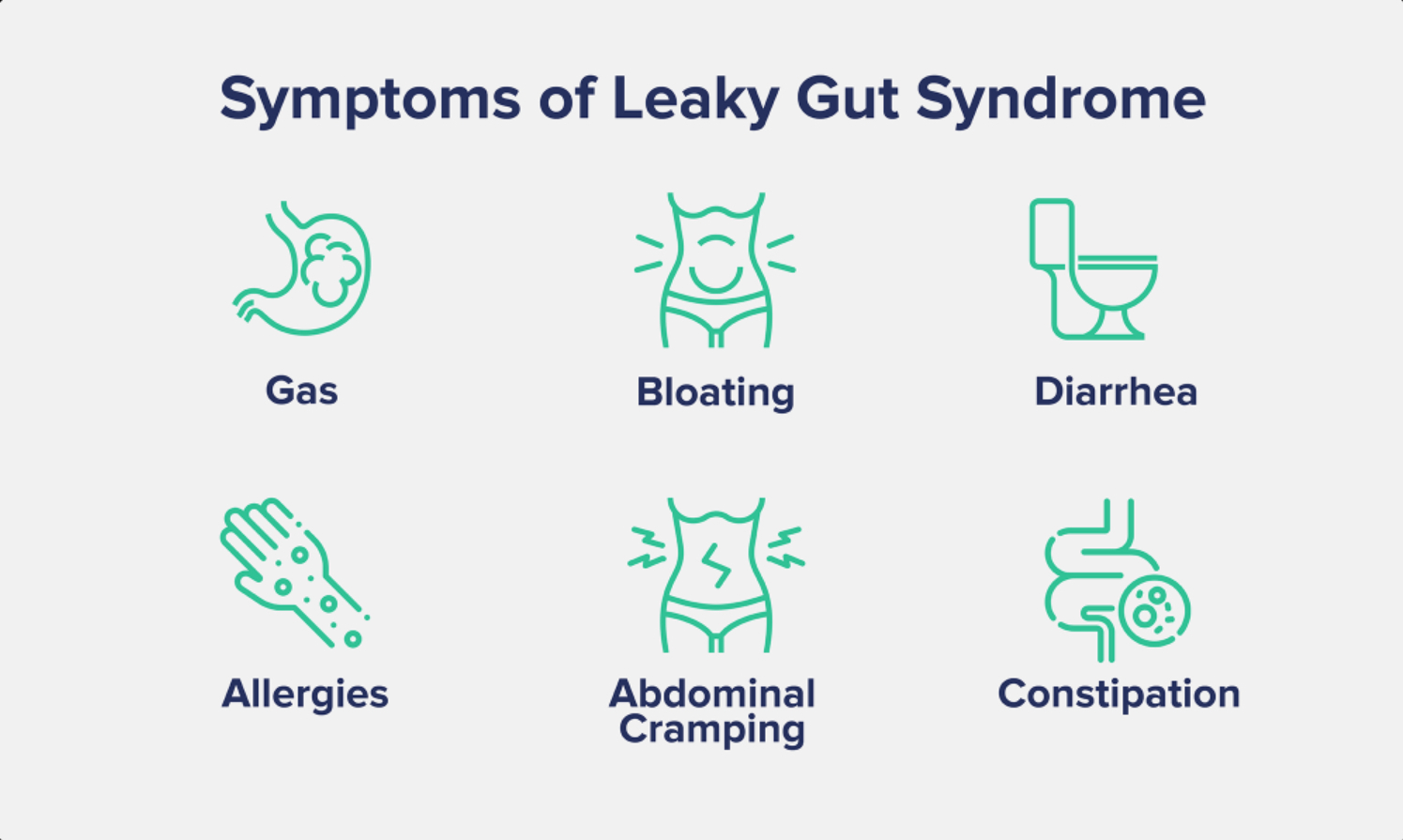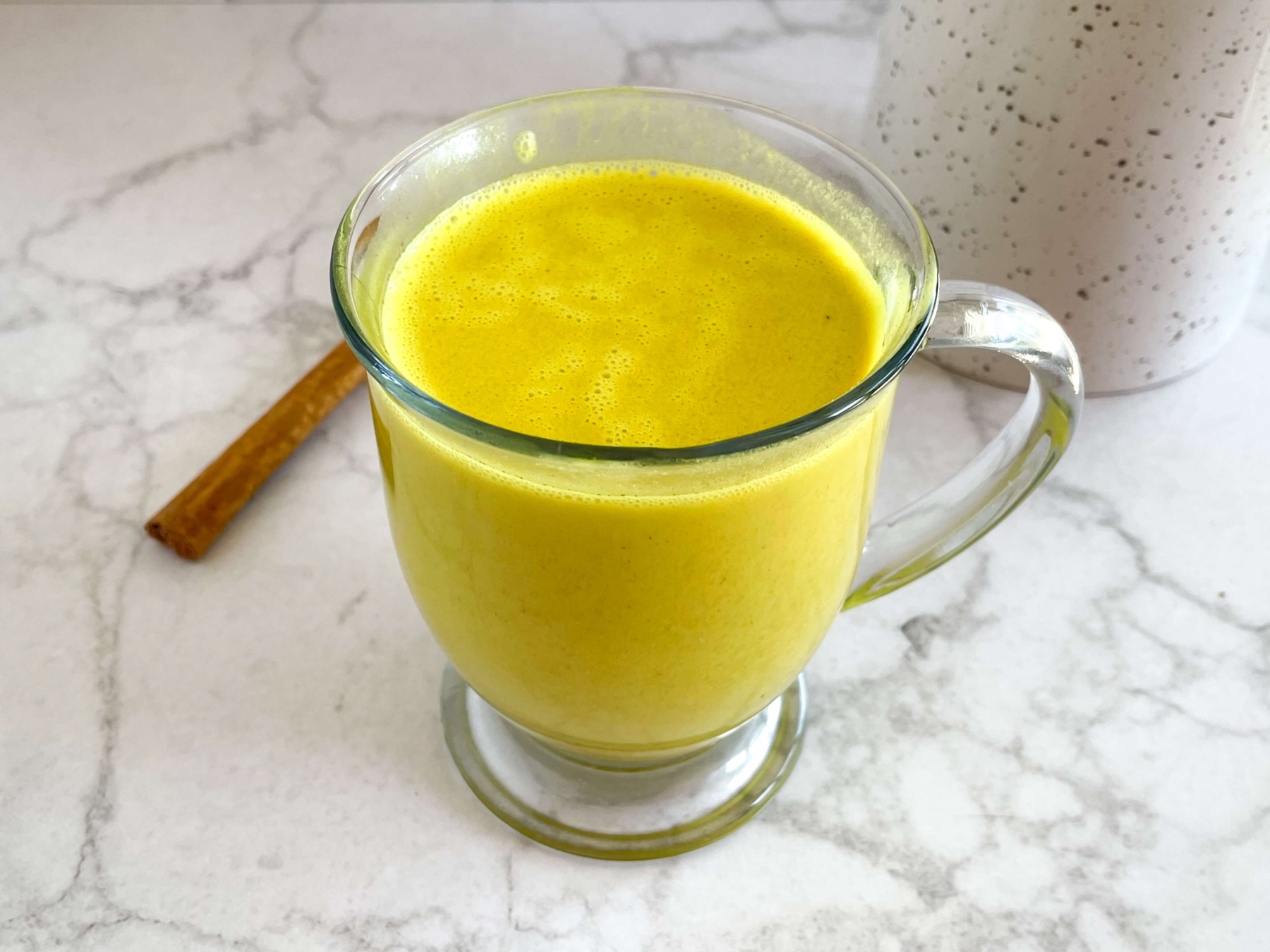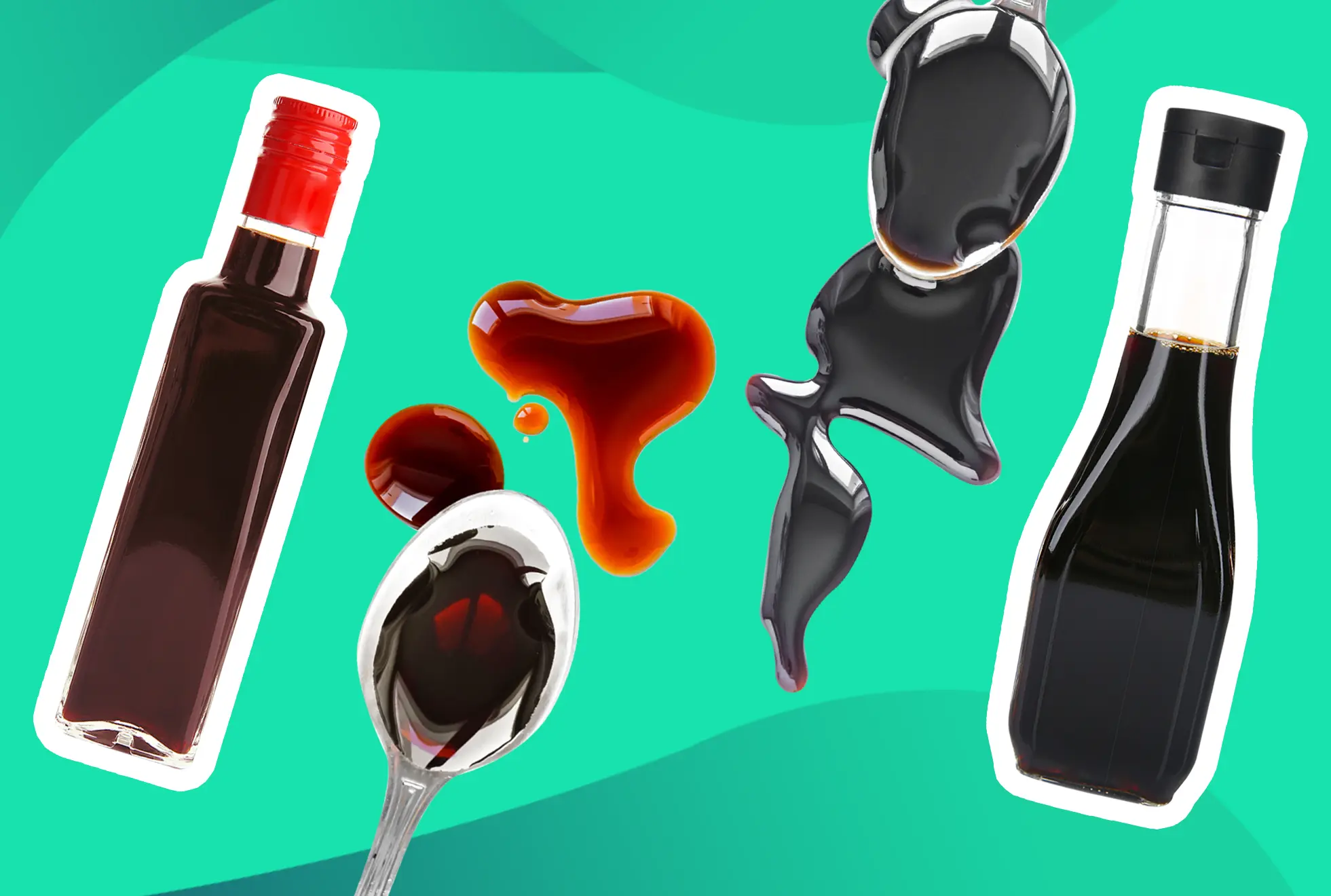7-Day Leaky Gut Diet Plan
Evidence Based Research To fulfill our commitment to bringing our audience accurate and insightful content, our expert writers and medical reviewers rely on carefully curated research.
Read Our Editorial Policy
Leaky gut—also known as increased intestinal permeability—occurs when the thin layer of cells that line the intestine becomes “leaky,” and gaps begin to grow larger and larger between the cells.
When the intestinal lining becomes leaky and permeable, it’s thought that toxins, pathogens, and large proteins travel out of the gut into the bloodstream, potentially contributing to both digestive and non-digestive symptoms and diseases.
Although the research backing up leaky gut syndrome is still relatively new, many health practitioners are targeting this condition as a way to improve both digestive and overall health.
In this article, learn more about how to fix a leaky gut, gut-healing foods for leaky gut, which foods to avoid, and a 7-day sample leaky gut menu.
End the Bloat Saga
Map your microbiome triggers and eat without fear.
End the Bloat Saga
Map your microbiome triggers and eat without fear.


Foods to Eat for Leaky Gut
The main foods to consume for leaky gut are nutrient-dense foods, which tend to go hand-in-hand with anti-inflammatory foods.
- Fruits: Berries, apples, pears, pomegranate, and citrus fruit are all high in antioxidants and polyphenols. However, all fruits can be consumed on a leaky gut diet.
- Vegetables: Leafy greens, broccoli, Brussels sprouts, cabbage, arugula, carrots, kale, beetroot, Swiss chard, spinach, ginger, mushrooms, zucchini, potatoes, sweet potatoes, carrots, squash, and more. Some people might have digestive symptoms after eating cruciferous vegetables (broccoli, cauliflower, Brussels sprouts, etc.) and may need to eat smaller amounts of them while healing leaky gut.
- Prebiotic plants: Prebiotics help to prevent or heal leaky gut by strengthening the intestinal barrier, boosting healthy bacteria growth, and providing fuel for intestinal cells to thrive. Prebiotic foods include leeks, apples, asparagus, chicory, garlic, onions, and Jerusalem artichokes.
- Fish and seafood: Salmon, mackerel, anchovies, tuna, and sardines are especially rich in omega-3 fatty acids, which are beneficial for reducing inflammation in the gut. However, all fish and seafood are healthy for leaky gut.
- Meat, poultry, and eggs: Chicken, turkey, venison, and some pork, lamb, and beef. Ideally, the meat will be pasture-raised (poultry, eggs, and pork) or grass-fed (lamb and beef).
- Nuts and seeds: Walnuts, almonds, pistachios, macadamia nuts, chia seeds, hemp seeds, flax seeds, etc.
- Beans and legumes: Lentils, black beans, garbanzo beans, white beans, kidney beans, etc. Similar to cruciferous vegetables, some people might have trouble digesting fibrous beans and legumes while healing their leaky gut.
- Gluten-free grains: Buckwheat, rice, quinoa, and gluten-free oats.
- Herbs and spices: All herbs and spices are healthy, especially oregano, rosemary, turmeric, ginger, garlic, cinnamon, parsley, cloves, saffron, and basil.
- Healthy fats: Extra-virgin olive oil and olives, avocado oil and avocados, coconut and coconut oil.
- Fermented or cultured foods: Kefir, yogurt, Greek yogurt, sauerkraut, kimchi, low-sugar kombucha, and miso are probiotic-rich foods.
- Beverages: Water, tea, coffee, bone broth, nut milk without additives or preservatives.
These foods and drinks provide antioxidants, polyphenols, vitamins, minerals, protein, and healthy fats to support strong intestinal barrier function and gut microbe diversity.
Fiber is especially important for people with leaky gut to consume—specifically soluble fiber, because the intestinal fermentation of this fiber increases production of butyrate, a short-chain fatty acid (SCFA) that strengthens the intestinal barrier.
Foods to Avoid for Leaky Gut
There are many inflammatory foods and beverages that can negatively impact the gut microbiome and the intestinal lining, including:
- Processed foods high in refined carbohydrates, fat, or sugar, including fast food, chips, crackers, candy, desserts, white bread, and sweets.
- Fried food
- High-fructose corn syrup
- Alcohol
- Artificial and natural non-caloric sweeteners: Aspartame, sucralose, and stevia.
- Conventionally farmed meat and processed meat: Hot dogs, bacon, most deli meat.
- Unhealthy fats, like trans fats, margarine, shortening, lard, and omega-6-rich seed oils, including canola, vegetable, and soybean oil.
- Gluten: Wheat, barley, rye, bread, pasta, crackers, baked goods, etc.
- Non-fermented dairy: Milk, cheese, ice cream, cream.
Lastly, medications like NSAIDs (non-steroidal anti-inflammatory drugs, like ibuprofen and aspirin) and lifestyle choices like smoking cigarettes can negatively impact leaky gut.
7-Day Leaky Gut Diet Plan: How to Fix a Leaky Gut
This 7-day sample leaky gut diet plan focuses on eating foods that support the growth of healthy gut bacteria and strengthen the intestinal lining, while removing foods that disrupt the gut or commonly cause digestive symptoms.
Day 1
Breakfast: Strawberry-banana oat smoothie (Note: use gluten-free oats)
- Recipe: Easy Breakfast Smoothie
Lunch: Spinach salad with hard-boiled eggs, pasture-raised chicken, red onion, and cherry tomatoes
Snack: Unsweetened Greek yogurt with apple slices
Dinner: Roasted or grilled salmon, asparagus with lemon and olive oil, and roasted red potatoes
Day 2
Breakfast: Overnight chocolate chia pudding
- Recipe: Chocolate Chia Pudding
Lunch: Tuna salad with grain-free crackers or veggie sticks
Snack: Cup of kefir with berries on the side
Dinner: Grass-fed beef and broccoli stir-fry with brown rice
Day 3
Breakfast: Tropical smoothie with coconut
- Recipe: Pina Colada Smoothie
Lunch: Mediterranean-style quinoa salad
- Recipe: Mediterranean Quinoa Salad
Snack: 2 hard-boiled eggs and low-sugar kombucha
Dinner: Dairy-free leek and potato soup made with bone broth
Day 4
Breakfast: Gluten-free oatmeal bowl with raspberries, almond butter, and hemp seeds
Lunch: Tuna cucumber boats
- Recipe: Tuna Salad Cucumber Boats
Snack: Cup of bone broth and handful of sprouted nuts
Dinner: Kale apple salad with chicken
- Recipe: Kale Apple Salad
Day 5
Breakfast: Scrambled eggs with chopped asparagus and onion
Lunch: Arugula salad with grilled chicken, strawberries, and walnuts
Snack: Greek yogurt with diced pear
Dinner: Bun-less grass-fed burgers with pickled onions and homemade sweet potato fries
- Recipe: Pickled Onions
Day 6
Breakfast: Golden milk and cup of yogurt
- Recipe: Golden Milk
Lunch: Broccoli salad with sauerkraut or kimchi added
- Recipe: Broccoli Crunch Salad
Snack: Grass-fed meat stick, berries, and nuts
Dinner: Lamb bowls with grass-fed lamb, turmeric rice, cucumber, tomatoes, and dill yogurt sauce
Day 7
Breakfast: Omelet with smoked salmon and chives
Lunch: Taco bowls with ground turkey, lettuce, avocado, tomatoes, salsa, and Greek yogurt (instead of sour cream)
Snack: Sliced apples or pear and nut butter
Dinner: Herb-lemon salad with baked salmon or cod (note: no cheese)
- Recipe: Chopped Lemon Veggie Salad
Leaky Gut FAQs
What Are the Warning Signs and Symptoms of Leaky Gut?

The most apparent symptoms of leaky gut are gastrointestinal-related, such as gas, bloating, abdominal cramping, food intolerances or allergies, constipation, or diarrhea.
However, leaky gut is also thought to cause non-digestive symptoms, which are more challenging to pinpoint.
Some studies have linked leaky gut to neurological conditions, obesity, metabolic syndrome, type 2 diabetes, acne or skin conditions, celiac disease, autoimmune diseases, migraines, chronic fatigue syndrome, mood disorders, and autism.
However, it’s not known for sure if leaky gut impacts these conditions, and it can be difficult to determine if leaky gut is a cause or symptom.
Animal studies have shown that increased intestinal permeability occurs before the onset of some diseases—including type 1 diabetes, celiac disease, and irritable bowel syndrome—suggesting that leaky gut can be a cause rather than a symptom.
Which Foods Heal a Leaky Gut?
Gut-healing foods for leaky gut include fruits, vegetables, prebiotic-rich plants (leeks, onion, garlic, apple, asparagus), lean protein, healthy fats, fermented or cultured foods, and antioxidant-rich beverages like tea and coffee.
What Foods To Avoid If You Have Leaky Gut?
Foods to avoid with leaky gut are typically highly processed or contain inflammatory ingredients.
It’s recommended to avoid or limit processed foods high in refined carbohydrates, fat, or sugar (fast food, fried food, chips, crackers, candy, desserts, white bread, and sweets), high-fructose corn syrup, artificial sweeteners, stevia, alcohol, trans fats, seed oils, gluten, and non-fermented dairy.









1 Comment
Please add me to your mailing list